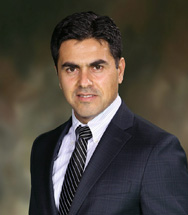
Yerevan Saeed called his time covering the White House and President Obama "really amazing."
By his count, Yerevan Saeed has been a refugee in conflict zones four times in his life.
“Three times before I was 11 years old,” he said. “I grew up in a conflict zone.”
Saeed and his family were part of an estimated six million Kurds living in Iraq. Yet a few years ago, he was covering President Barack Obama in the White House press briefing room with the other members of the International Press Corps.
At the time Saeed was a correspondent for Kurdish Rudaw TV. But Saeed, who also has contributed to the New York Times, has put his journalism on hold while he studies for a PhD at George Mason University’s School for Conflict Analysis and Resolution.
“I’ve seen international war, I’ve seen civil war, and always I believed diplomacy can resolve conflict,” he said. “I want to work in diplomacy and I thought a program at S-CAR would give me the tools that I would need to be a successful diplomat.”
It does not hurt that Saeed is also fluent in Kurdish, Arabic, Farsi and English, a skill that would certainly benefit a diplomat.
Saeed has always been eager for education. He completed elementary school and high school in Iraqi Kurdistan. One academic year was denied by the Iraqi government because Saeed’s family had fled to Iran as refugees.
After graduating from high school, Saeed received a scholarship from Exxon Mobil to attend college at the University of Texas in Austin.
“That completely changed my life for the best,” he said.
After earning a bachelor’s degree in government, he received his master’s degree at Tufts University’s Fletcher School of Law and Diplomacy. He is a research associate at the Arab Gulf States Institute and works as a political analyst while studying at George Mason. He lives in Arlington, Va., with his wife and two young children.
While the relationship between the Kurds and the Iraqi government remains in conflict, Saeed does not see himself returning to that international hotspot to practice diplomacy.
“The problems in Iraq are all about nepotism, and the political situation is very gloomy,” he said. “I don’t see improvement in the foreseeable future.”
Instead, he’d like to work for the U.S. Department of State, not far from where he was stationed in his previous career, covering the White House.
“It was really amazing,” he said of his time covering President Obama. “It was the president of the United States just a few feet from you. It was just a different experience, sometimes just unreal. I always think about that in my journey. Probably in the future, when I am writing my own story, I will call it, ‘From Refugee Camps to the White House.’ That will be the title of my book.”
